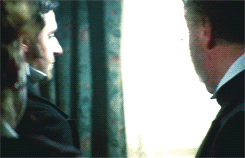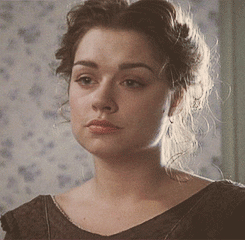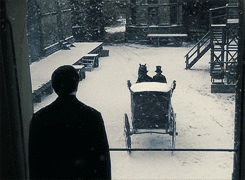What do you think?
Rate this book


521 pages, Paperback
First published January 1, 1855
He almost said to himself that he did not like her, before their conversation ended; he tried so to compensate himself for the mortified feeling, that while he looked upon her with an admiration he could not repress, she looked at him with proud indifference, taking him, he thought, for what, in his irritation, he told himself he was — a great rough fellow, with not a grace or a refinement about him.John is just such a precious little boy, like, my man is just damn insecure and confused that he's so shook about Margaret, and honestly, I can relate. He tries so hard to gain control of his emotions but he's immediately besotted by her.
It was the frank familiar custom of the place; but Margaret was not prepared for it. She simply bowed her farewell; although the instant she saw the hand, half put out, quickly drawn back, she was sorry she had not been aware of the intention.You could seriously make a whole saga about their hand touching business because Miss Gaskell really thought this shit through. I mean it takes so many tries for them to finally shake hands that when they do "he knew it was the first time their hands had met, though she was perfectly unconscious of the fact." I love a self-aware queen! ;)
‘I spoke hastily to you once this evening, and I am afraid, rather rudely. But you know I am but an uncouth Milton manufacturer; will you forgive me?’John and Margaret disagree on almost every single topic, especially when it comes to trade and life in the North compared to the South, and I love their exchange of blows ... but what I absolutely fucking stan are the moments of tenderness during which John tries to get on Maragret's good side again. I mean, he truly is a soft boiiiii.
Mr. Thornton felt that in this influx no one was speaking to Margaret, and was restless under this apparent neglect. But he never went near her himself; he did not look at her. Only, he knew what she was doing — or not doing — better than he knew the movements of any one else in the room.John cares so much for Margaret. He wants her to have friends, he wants her to be accepted by the people in Milton. He genuinely wants her to be happy and have a good time ... but since he's an anxious smol son, AAAAAANGST gets in the way of him reaching out to her. I cry.
Everything seemed dim and vague beyond — behind — besides the touch of her arms round his neck — the soft clinging which made the dark colour come and go in his cheek as he thought of it.Hold my fucking beer, because I knew I was a goner after this scene. Gaskell is such a drama queen and I am 100% here for it. That whole scene. What a mess! Thornton's complete lack of chill whenever Margaret is involved really mesmerises me.
‘And the gentleman thus rescued is forbidden the relief of thanks!’ he broke in contemptuously. ‘I am a man. I claim the right of expressing my feelings.’YOU TELL HER, JOHN! I mean, Margaret was completely savage in her refusal and I love her for it, but my precious boy did really well by standing his ground and letting more of his vulnerable side show.
He lashed himself into an agony of fierce jealousy. He thought of that look, that attitude! — how he would have laid his life at her feet for such tender glances, such fond detention!I mean, let's not kid ourselves, there's one thing this book excels at and that's pining BUT John is always soooo respectful when it comes to his feelings towards Margaret? He doesn't think she belongs to him, he's fully convinced she'll never have him and that she's too good for him and after her refusal, he just accepts that and leaves her alone, despite the fact that his feelings for her haven't vanished.
‘No!’ said he, ‘I put it to the touch once, and I lost it all. Let her go — with her stony heart, and her beauty; — how set and terrible her look is now, for all her loveliness of feature! She is afraid I shall speak what will require some stern repression. Let her go. Beauty and heiress as she may be, she will find it hard to meet with a truer heart than mine. Let her go!’I mean, BITCH, I cried. I really thought it was over at this point. Their farewell was heartbreaking. John was so bitter and sad about it but he knew there was nothing he could to, and so he let her be. Like, we stan a realistic queen!
He came close to her. He knelt by her side, to bring his face to a level with her ear; and whispered-panted out the words:— ‘Take care. — If you do not speak — I shall claim you as my own in some strange presumptuous way. — Send me away at once, if I must go; — Margaret! —’These hoes really had me convinced that they wouldn't end up together, like, I had mentally prepared myself for Margaret marrying motherfucking Lennox (this man can choke, boyyy) and so you will believe how shooketh I was when I found out that Margaret and Johnny boy would be endgame. I mean, nothing will top his declarations of love.
‘I wanted to see the place where Margaret grew to what she is, even at the worst time of all, when I had no hope of ever calling her mine. I went there on my return from Havre.’He went to Helstone, the place of her upbringing, like what? John is a hopeless romantic AND, not gonna lie, this book turned me into one as well. I watched the BBC mini series two times within the span of three days, and I need Richard Armitage as John Thornton in my life. He can get it any day.
‘Bless her!’ said Dixon. ‘She’s as sweet as a nut. There are three people I love: it’s missus, Master Frederick, and her. Just them three. That’s all. The rest be hanged, for I don’t know what they’re in the world for.’In general, North & South featured many moments that I could easily relate to: Margaret's disgust at all the men who are interested in her, her inability to refuse nicely, Margaret being tired all the time. She is hands down one of my favorite heroines in Victorian literature. Such a strong and self-determined woman! I will leave you with my favorite moment of hers: “He was speaking in a subdued voice, as if to her alone. She did not wish to be so exclusively addressed. She replied out in her usual tone.” What. A. Savage.

"He almost said to himself that he did not like her, before their conversation ended; he tried so to compensate himself for the mortified feeling, that while he looked upon her with an admiration he could not repress, she looked at him with proud indifference, taking him, he thought, for what, in his irritation, he told himself he was-a great rough fellow, with not a grace or a refinement about him."

"He shook hands with Margaret. He knew it was the first time their hands had met, though she was perfectly unconscious of the fact."


"He laid her down softly, and looking on her pure white face, the sense of what she was to him came upon him so keenly that he spoke it out in his pain:
'Oh, my Margaret-my Margaret! no one can tell what you are to me!'"

'I dare not hope. I never was fainthearted before; but I cannot believe such a creature cares for me.'
...
'But I know she does not care for me. I shall put myself at her feet-I must. If it were but one chance in a thousand-or a million-I should do it.'

'You look as if you thought it tainted you to be loved by me. You cannot avoid it. Nay, I, if I would, cannot cleanse you from it. But I would not, if I could. I have never loved any woman before: my life has been too busy, my thoughts too much absorbed with other things. Now I love, and will love. But do not be afraid of too much expression on my part.'

"How was it that he haunted her imagination so persistently? What could it be? Why did she care for what he thought, in spite of all her pride in spite of herself?"

"He lashed himself into an agony of fierce jealousy. He thought of that look, that attitude!-how he would have laid his life at her feet for such tender glances, such fond detention!"

"What shall I do? What do I mean? Why do I care what he thinks, beyond the mere loss of his good opinion as regards my telling the truth or not? I cannot tell. But I am very miserable! Oh, how unhappy this last year has been!"

'Where she had suffered so much.' Alas! and that was the way in which this eighteen months in Milton-to him so unspeakably precious, down to its very bitterness, which was worth all the rest of life's sweetness-would be remembered.


'I wanted to see the place where Margaret grew to what she is, even at the worst time of all, when I had no hope of ever calling her mine.'


'Oh, Mr. Thornton, I am not good enough!'
'Not good enough! Don't mock my own deep feeling of unworthiness.'




'You do not know the South. Mr. Thornton,' she said, collapsing into a determined silence, and angry with herself for having said so much.While much of N&S is the story of how these two very different people learn to see their own (and their part of the country's) shortcomings and gain appreciation for the other person and their way of life, there is so much more going on in this novel that it would be a real disservice to view it just as a love story. Gaskell explores industrialization, the unionization movement and the changing lives of all of the characters. I could spend a long time talking about how she weaves in themes of prejudice, understanding, power and a person's duty to those he or she has power over, and the roles of women and men in society. Let's just say that Gaskell was a very advanced thinker for her time.
'And may I say that you do not understand the North?' asked he, with an inexpressible gentleness in his tone, as he saw that he had really hurt her.








❝ Take care. If you do not speak – I shall claim you as my own in some strange presumptuous way. Send me away at once, if I must go; – Margaret! –❞
❝ He shrank from hearing Margaret's very name mentioned; he, while he blamed her – while he was jealous of her – while he renounced her – he loved her sorely, in spite of himself.❞
❝ Margaret was not a ready lover, but where she loved she loved passionately, and with no small degree of jealousy.❞
❝ Margaret the Churchwoman, her father the Dissenter, Higgins the Infidel, knelt down together. It did them no harm.❞
❝ I know you despise me; allow me to say, it is because you do not understand me.❞
❝ I wanted to see the place where Margaret grew to what she is, even at the worst time of all, when I had no hope of ever calling her mine. ❞




